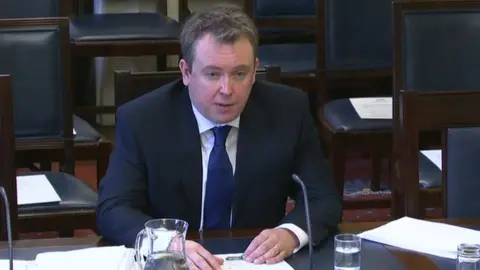Bill to give ministers more power to become law
 BBC
BBCA bill which could give every Stormont minister more power to make autonomous decisions looks set to become law.
The Executive Committee (Functions) Bill received accelerated passage through the assembly with little debate.
However, a former DUP adviser has warned the party is "sleepwalking" into profound constitutional change.
Richard Bullick said the bill would overturn key safeguards for unionists in the St Andrews Agreement.
Ministers argue it is necessary because a court judgement two years ago over a huge incinerator at Mallusk would mean that every major planning decision would have to come to the executive.
However, Mr Bullick, for many years a special adviser to the then-DUP leader and First Minister Peter Robinson, claimed it would have much wider implications.
'Flows from misconceptions'
Writing in the News Letter, he said the bill rewrites safeguards designed to ensure no minister could ever again take controversial decisions on their own, as the Sinn Féin Education Minister Martin McGuinness did when he abolished the 11-plus on his last day in office.
"The proposed changes seriously undermine the DUP's claim to have a veto on all important decisions in NI," Mr Bullick wrote.

"The essential purpose of the amendment is to redefine a test for full executive consideration in a way which would increase ministerial autonomy.
"This was done by limiting the meaning of what constitutes a "cross-cutting" matter, reducing the range of decisions that have to come to the executive.
"Why then are the DUP appearing to be reversing a long-standing policy? My view is that it is not a change of policy but flows from misconceptions in what is a complex area of law."
On Monday, at the bill's further consideration stage, MLAs rejected an amendment tabled by the Ulster Unionist Doug Beattie which would have removed one of the two clauses in the bill, which give more power to ministers.
He told the assembly: "This bill intends to give ministers more power and that can be abused and I don't want to see it abused and I'm not talking about one party or the other party.
"I don't want to see any minister abusing their power and the way to stop them either deliberately or accidentally abusing their power is to have a scrutiny mechanism which is in the executive already and can be found in the St Andrews Agreement."
He said the bill needed more scrutiny.
'Two lawyers together'
Former DUP MLA Jim Wells, who has lost the party whip, said there was a lot of concern about the bill on the DUP backbenches, but MLAs were being "frogmarched" through the lobbies to vote for it.
But DUP MLA Christopher Stalford said claims that a clause saying significant or controversial matters would only be required to come to the executive if they satisfied a test of being "more than incidentally cross-cutting", was a misunderstanding of the bill.
He described Mr Bullick, a lawyer, as a friend who had attended his wedding, but said the Executive Office had received advice from the departmental solicitor's office and the former attorney general.
"Where you get one or two lawyers together they can argue a black crow is white until the day is done," he added.
The SDLP chair of the Executive Office committee, Colin McGrath, asked: "Is this debate about the bill or a debate about Richard Bullick?"
On Tuesday, the Executive Committee (Functions) Bill will have its final stage before receiving Royal Assent.
